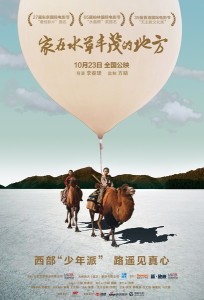River Road
家在水草丰茂的地方
China, 2014, colour, 1.85:1, 102 mins.
Director: Li Ruijun 李睿珺.
Rating: 4/10.
Thin, typically arty-ethnic fare centring on two boys’ desert odyssey to join their parents.
Gansu province, northwest China, the present day. In the so-called Hexi Corridor, part of the old Silk Route, the grasslands are drying up and herdsmen of the Yugur ethnic minority are having to travel farther to find grazing land for their sheep. Young people are selling their herds and turning to farming and other work like gold panning. Bateer (Guo Songtao) and Adikeer (Tang Long) are the two young sons of Odorji (Guo Jianming), a traditional herdsman. Bateer, the older, was largely raised by his grandfather (Bai Wenxin), to whom he was sent when his mother (Zhang Min) was pregnant with Adikeer. He has always resented this, and also resents Adikeer’s greater popularity. The boys’ father drops them off at their boarding school before setting off to join his wife, who is not well, and tend his herd. The well of the grandfather, who lives alone outside town, has run dry and he is forced to sell all his sheep. After the grandfather dies, Adikeer proposes to Bateer that, as it’s the school’s summer holiday, they both set out to find their father, thereby fulfilling Bateer’s promise to his grandfather to visit his mother. Bateer grudgingly agrees and they set off on two camels, but throughout the journey Bateer is non-communicative and difficult. As they travel, their water runs low, they temporarily become lost, and Adikeer’s camel then falls ill.
REVIEW
River Road 家在水草丰茂的地方, the fourth feature by indie film-maker Li Ruijun 李睿珺 – again set in his dusty native province of Gansu, northwest China, and again centring on stubborn figures in a hard landscape – is a step back from his last, the warmer and more accessible Fly with the Crane 告诉他们,我乘白鹤去了 (2012). Li’s original script has none of the quiet irony of Crane, instead focusing on a camel trip undertaken by two boys to join their herdsman father after their grandfather dies. Despite a slight social edge to the story – the boys are from the Yugur ethnic minority (a sub-set of the better-known Uyghurs of Xinjiang province), who are finding it more and more difficult to graze their sheep as the land and its wells dry up – there’s little depth to the film beyond the journey itself, a perilous trek through barren desert in which homes have been abandoned and water is scarce. The ending has a small sting in its tale, but at 102 minutes this is thin, typically arty-ethnic fare that never goes farther than the festival circuit.
Li has swopped previous d.p. Yang Jin 杨瑾 (The Old Donkey 老驴头, 2010; Crane) for the more experienced Liu Yonghong 刘勇宏 (Blind Shaft 盲井, 2003; Grain in Ear 芒种, 2005; Luxury Car 江城夏日, 2006) to no visible advantage: Liu’s landscapes are always striking, as they could hardly fail to be, given the imposing setting, but actually have less texture than Yang’s. The only drama comes from the two boys’ distanced relationship, with the resentful older one, Bateer, proving a difficult companion to the younger, more practical one, Adikeer (played by Tang Long 汤龙, the likeable grandson in Crane), and its resolution is as taciturnly handled as their quarreling. Ma Xingchun 马兴春, who played the stubborn title character in Donkey and the crafty coffin-maker in Crane, pops up briefly near the end as an old lama. The plaintive, droney music by Peyman Yazdanian, from Love and Bruises 花 (2011) and Mystery 浮城谜事 (2012) by Lou Ye 娄烨, adds some atmosphere but tends to come and go in chunks rather than be a co-traveller.
The English title refers to the father’s instruction to the boys to follow the dried-out river course to reach him; the Chinese one means “Home in a Lush, Luxuriant Place”, shown in a fantasy sequence in which the desert turns green. The film is also known as Where Is My Home.
CREDITS
Presented by Laurel Film (CN), Heaven Pictures (Beijing) Film (CN), Li Ruijun Film Studio (CN).
Script: Li Ruijun. Photography: Liu Yonghong. Editing: Li Ruijun. Music: Peyman Yazdanian. Art direction: Li Ruijun, Wu Jinying. Sound: Zhao Jiaming, Wang Changrui, Fu Kang.
Cast: Tang Long (Adikeer), Guo Songtao (Bateer), Guo Jianming (Odorji, father), Bai Wenxin (grandfather), Ma Xingchun (old lama), Feng Wenhao (young Adikeer), Liu Jianyu (young Barteer), Zhang Min (mother), Wu Yongzhi (Mao Lan, young priest), Awanglexie (funeral priest), Yang Xia (female teacher), Huang Tao (male teacher), Tang Jilu (well-digger), Ma Jiyin (well-digger’s apprentice), Wang Zhong (doctor), Li Shengfu (camel keeper), Wan Degui (sheep buyer), Zhang Jinhai (gold panner).
Premiere: Tokyo Film Festival (Competition), 26 Oct 2014.
Release: China, 23 Oct 2015.
(Review originally published on Film Business Asia, 2 Dec 2014.)
